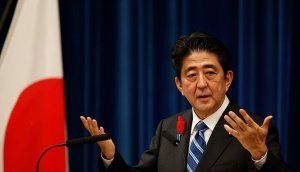South Korean and Japanese Leaders to Join Obama at Meeting
By CHOE SANG-HUNMARCH 21, 2014
SEOUL, South Korea — President Park Geun-hye of South Korea and Prime Minister Shinzo Abe of Japan will talk next week after months of tense relations that had blocked them from meeting each other, South Korea’s Ministry of Foreign Affairs said on Friday.
Ms. Park and Mr. Abe, the leaders of Washington’s two key allies in northeast Asia, will join President Obama in a trilateral meeting brokered by the United States on the sidelines of a nuclear security summit meeting early next week in the Netherlands, the ministry said in a brief statement. In Tokyo, the Japanese Ministry of Foreign Affairs issued a similar statement.
The three leaders will discuss North Korea’s nuclear threats, as well as nuclear nonproliferation efforts, the South Korean statement said.
Even though both have been in office for more than a year, the leaders have yet to do more than shake hands, despite American urgings that they work together against threats like North Korea’s nuclear program.
Thorny historical issues that have divided Seoul and Tokyo are not included in the agenda. But South Korea said it was in separate talks with Japan to arrange a senior-level dialogue about Korean and other Asian women who were forced into sexual slavery for Japanese soldiers during World War II.
Photo

President Park Geun-hye of South Korea delivered a speech on the national budget in Seoul in November.
Credit Lee Jin-Man/Associated Press For years, South Korea has asked Japan to offer compensation to the women. Japan says the issue was settled by the 1965 treaty that normalized diplomatic ties between Tokyo and Seoul.
Japan’s tense relations with South Korea have been further strained in recent years as some nationalist politicians in Japan have made comments denying state responsibility for the women’s being forced into sexual slavery.

Photo Prime Minister Shinzo Abe of Japan at a news conference on sales taxes in Tokyo last year.
Credit Toru Hanai/Reuters
Ms. Park has accused Mr. Abe of pandering to right-wing politicians in Japan whom South Korea suspects of glorifying its history of aggression in the 20th century. Mr. Abe’s visit last December to the Yasukuni Shrine in Tokyo, which honors Japan’s war dead, including Class A war criminals from the World War II era, deepened Korean suspicions.
Washington has repeatedly appealed to Seoul and Tokyo to cooperate more closely in dealing with the North Korean nuclear threat and China’s rising military power. But Ms. Park has refused to meet Mr. Abe, calling him untrustworthy.
A breakthrough came on March 14 when Mr. Abe said he would not try to revise the 1993 Kono Statement, in which his country offered a landmark apology for the sex slavery. Japanese nationalist politicians have called for scrapping the statement, arguing that there is not enough evidence that the women had been coerced.
Last Saturday, Ms. Park welcomed Mr. Abe’s decision, raising hopes for the meeting in the Netherlands.
The trilateral summit meeting will be the first face-to-face discussions for the leaders of Japan and South Korea in 22 months.